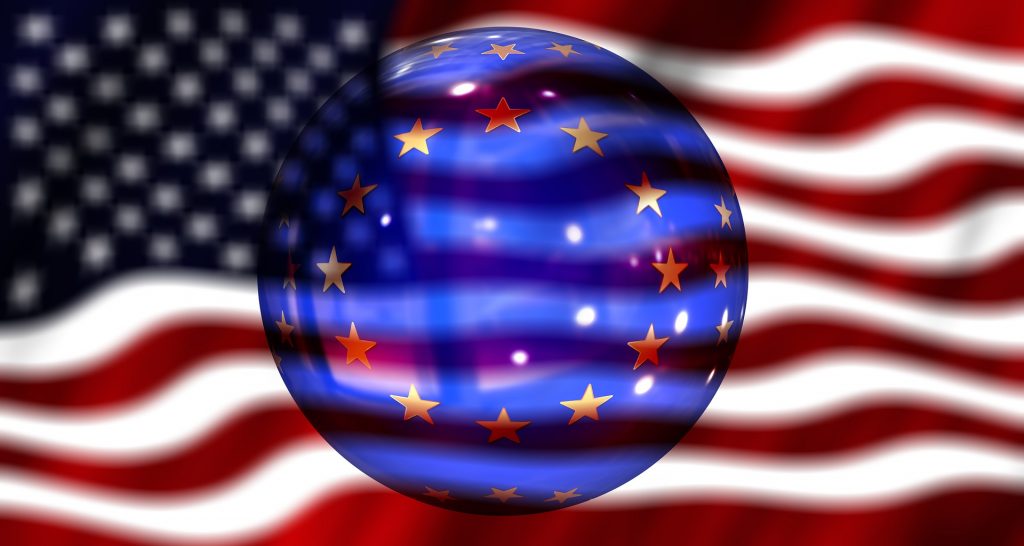The COVID-19 pandemic has accentuated the dynamics of contemporary transatlantic relations, which oscillate between cooperation and rivalry at a time of competition between great powers. As the United States (US) continues on the path of unilateralism, the European Union (EU) is torn between an historic opportunity to develop its strategic autonomy and its traditional lack of cohesion. In this context, several experts have studied the future of transatlantic relations as part of conferences organised by the Brookings Institute during summer of 2020. This “hot take” presents an overview.
The European Union at the heart of great power competition
The EU has been hit hard by the pandemic as competition between great powers increases. The EU is trying to send a clear message to China in the face of the aggressiveness of its international policy while seeking strategic autonomy at a time when the US continues its questioning of multilateralism.
The EU, whose unity was weakened at the height of the pandemic, is wedged between the US and China in an increased competition between great powers. However, at the moment, the EU is far from having all the cards in hand to assert itself as a major player in the midst of this competition. The beginning of the pandemic has highlighted one of the biggest weaknesses of the EU, namely its disunity, with a management of COVID-19 more national than multilateral, and a lack of solidarity towards its most affected members. China then took advantage of this open door to criticize the European management of the pandemic while offering to help where the EU was lacking. However, the EU subsequently recovered by providing logistical aid, liquidity reserves to local banks, essential medical and pharmaceutical equipment, as well as by increasing European production of protective equipment for health workers and by strengthening regional surveillance of the pandemic.
Moreover, the EU perceives China less and less as a partner and more as a rival . This change of position follows the many aggressive actions from China, especially in cyberspace, but also reacts to the nature of its political and economic development and its human rights record. Yet the Sino-European relationship is complex and far from a simple friend-foe dichotomy. Indeed, as recalled by European Commission President Ursula von der Leyen, the relationship between the EU and China is simultaneously one of the most strategically important and one of the most politically difficult. This is not to mention the strong economic ties that unite the two players, in particular the numerous Chinese investments in ports, railways, telecommunications and other essential investments that certain countries, such as Italy, Greece, and Portugal greatly need. In this regard, Italy has also concluded a multi-billion-dollar contract with China, thus strengthening its relationship with Beijing.
The pandemic has only reaffirmed the importance of the Chinese presence in Europe. As Brookings Institute associate researcher Giovanna De Maio highlights, Italian public opinion is beginning to see China more like a friend, and to distrust increasingly other European countries like France and Germany. Thus, even if Italian foreign policy has not seen a major turning point with regard to China, given its strong transatlantic position, pro-China and anti-EU movements are beginning to develop. This position is shared by Fiona Hill, also a researcher at the Brookings Institute, when she says that China, or Russia, can become an alternative to traditional partners for countries like Italy.
Faced with these challenges, German Defence Minister Annegret Kramp-Karrenbauer argues that despite disagreements within member countries, the EU must respond collectively, in particular by asserting its values of fundamental freedoms, equality and human rights against China. She adds that it is important to continue to invest in defence, despite a drop in defence budgets accentuated by the pandemic.
For Charles Fries, Deputy Secretary General for Common Security and Defense Policy of the European External Action Service, it will be important after the pandemic that the EU develops a strategic autonomy, enabling it to respond as a producer of security, while at the same time being ready to respond to threats on their own. It will also be important to reduce dependence on the security and technology sectors, while pushing the EU’s defence agenda further by developing its own defence capabilities.
Claudio Graziano, Chairman of the EU Military Committee, adds that the EU needs to develop its intelligence capabilities as well as a new approach to cyber defence and cyber intelligence. On this last point, the EU very recently imposed its first sanctions against cyber attacks from countries like China and Russia. However, while most European actors do not question the EU’s transatlantic ties, Timo Pesonen, director-general for the space and defence industry of the European Commission, says that the EU depends too much on the US and that it must be less transatlantic and more European.
Even if the beginnings of the pandemic have exposed the weaknesses of the EU, the latter seems to want to emerge strengthened from this pandemic. The EU is thus working to strengthen its strategic autonomy while implementing a Defence Europe to move away from dependence on the United States.
The United States: Ally or Rival?
Since Donald Trump’s arrival at the White House, the US’ relations with Canada and the EU have eroded and the US unilateralist attitude has been exacerbated during the pandemic, be it the attempt to block sales of protective masks to Canada or the attempt to have the exclusivity on a potential vaccine against COVID-19 at the expense of its allies. The “America First” doctrine indeed poses many challenges to the traditional allies of the US and reflects the American disengagement from the international sphere and its withdrawal from multilateralism. For Julianne Smith, a researcher at the Center for a New American Security and former Deputy National Security Advisor to Vice President Joe Biden, it is the first time in the history of EU-US relations US President shows regular and open contempt for the European project. Donald Trump indeed sees no value in the relationship between the US and the EU and even thinks that the EU was created to have an advantage over the US.
Transatlantic relations have also deteriorated during the COVID-19 pandemic, as Donald Trump’s United States are perceived as unreliable and unpredictable. In question, the unilateralist attitude of the US and its disengagement from the EU. While the US administration has decided to ban Europeans from traveling in the US without diplomatic consultations at the beginning of the pandemic, it now plans on a national option instead of a multilateral solution for securing its supply chains. Ellen Lord, the US undersecretary of defence for acquisitions and support, says that securing the supply chains requires a national approach and to be specifically made in the US. On the European side, the American attitude is ambiguous to say the least and reinforces the perception that the US is no longer a reliable ally of the EU. Indeed, while the Trump administration appears to be taking a stand in favour of the United Kingdom in the Brexit affair, it recently decided to withdraw a large part of its troops in Germany. President Trump justifies this decision by saying that Germany does not pay its 2% contribution to NATO and tries to take advantage of the US. However, the German Minister of Defence recalled that her country had always been a reliable NATO ally, and that given the increased aggressiveness of Moscow, Europe’s security also guarantees US security. She adds that it is unfortunate that the US is withdrawing its troops and that the redeployment of American troops will be a clear message to the EU. If the redeployment does not take place in Europe, this will be another sign of the abandonment of the EU by the United States. However, for Mark Esper, US Secretary of Defence, it is not about making a choice between Europe and Asia, but instead trying to find a balance between the two regions representing the interests and security challenges for the United States. The important thing for Washington is to optimize its positions to prepare itself over the long term for competition between the great powers.
Addressing common threats by strengthening transatlantic cooperation
In order to cope with the pandemic as well as with the rivalry with Russia and China, it is essential for the West to maintain solid transatlantic ties. On Covid-19 , it would be appropriate to coordinate approaches to diversify supply chains and reduce the dependence on China, to promote cooperation in the regulation of pharmaceuticals and medical equipment, to liberalise transatlantic restrictions on equipment medical, or to strengthen scientific exchanges, joint medical research, and cooperation in public health innovation. However, all of this is being undermined by President Trump’s selfish approach.
In the face of China, full cooperation between the US and the EU would create more levers to try to put in place more friendly policies. Transatlantic cooperation is also needed to protect the rules-based international liberal system challenged by China. Whatever the competitions and tensions, transatlantic cooperation must emphasize the values to be protected and promoted. Moreover, as Charles Fries reports , there seems to be discussions between the EU and the United States on the issue of China, a sign of a degree of cooperation. In addition, there are other signs of transatlantic cooperation, in particular the adoption by NATO and the EU of two joint declarations in 2016 and 2018 acting on 74 joint actions, as well as the meeting last June to discuss the common security implications of COVID-19 and the convergence of interests between the two organisations.
NATO must also successfully address its weaknesses in terms of cooperation to deal with the growing threat from China and Russia, according to Clark Cooper, assistant secretary for military affairs and policies at the US State Department. Moreover, the tactics of China and Russia to divide the NATO countries are not working because they share common values. According to him, the concept of security must be extended to the security of infrastructure and telecommunications. Finally, for the Deputy Secretary General of NATO, Mircea Geoana, the EU and NATO must bring together their identification of threats to foster a common approach. According to him, there is no place for a EU acting alone in defence and NATO remains key to international stability.
Moreover, NATO seems to seek to achieve a higher level of cooperation, particularly with regards to intelligence, with the development of the Joint Intelligence and Security Division, as noted by James Appathurai, NATO’s deputy assistant secretary-general for Political Affairs and Security Policy. This, the first civil-military division of NATO Headquarters, helps provide consistent estimates for decision-making within NATO. This division also permits, thanks to the information shared by all allies, some important decisions from NATO, including the deportation of about 150 undeclared Russian intelligence officers following the attempted assassination of Sergei Skripal in the UK.
Even though the last few months have shown a resurgence of transatlantic competition, with a unilateralist US and divided European positions, cooperation for all that has not been abandoned. Even though the pandemic has accentuated certain tensions, transatlantic relations remain solid all the same, thanks to common values and an institutionalized security community with NATO. The latter must redouble its efforts to address its weaknesses and increase cooperation amid great powers competition. For its part, the EU must not replace NATO, but supplement it, according to the German Minister of Defence. Finally, even if the transatlantic relations are in a turbulent period, with the rise of competition between the great powers and President Trump’s negative vision of Europe, there is a real potential to strengthen these relations that depends only on the will of the actors concerned. Much of that will could be found with the election of Joe Biden as President of the United States.





Comments are closed.